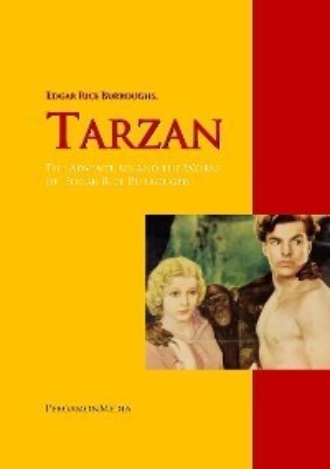
Полная версия
Tarzan: The Adventures and the Works of Edgar Rice Burroughs
Once in the current of the river she would be beyond Rokoff's power to stop her, for there was no other boat upon the shore, and no man, and certainly not the cowardly Rokoff, would dare to attempt to swim the crocodile-infested water in an effort to overtake her.
Rokoff, on his part, was bent more upon escape than aught else. He would gladly have forgone any designs he might have had upon Jane Clayton would she but permit him to share this means of escape that she had discovered. He would promise anything if she would let him come aboard the dugout, but he did not think that it was necessary to do so.
He saw that he could easily reach the bow of the boat before it cleared the shore, and then it would not be necessary to make promises of any sort. Not that Rokoff would have felt the slightest compunction in ignoring any promises he might have made the girl, but he disliked the idea of having to sue for favour with one who had so recently assaulted and escaped him.
Already he was gloating over the days and nights of revenge that would be his while the heavy dugout drifted its slow way to the ocean.
Jane Clayton, working furiously to shove the boat beyond his reach, suddenly realized that she was to be successful, for with a little lurch the dugout swung quickly into the current, just as the Russian reached out to place his hand upon its bow.
His fingers did not miss their goal by a half-dozen inches. The girl almost collapsed with the reaction from the terrific mental, physical, and nervous strain under which she had been labouring for the past few minutes. But, thank Heaven, at last she was safe!
Even as she breathed a silent prayer of thanksgiving, she saw a sudden expression of triumph lighten the features of the cursing Russian, and at the same instant he dropped suddenly to the ground, grasping firmly upon something which wriggled through the mud toward the water.
Jane Clayton crouched, wide-eyed and horror-stricken, in the bottom of the boat as she realized that at the last instant success had been turned to failure, and that she was indeed again in the power of the malignant Rokoff.
For the thing that the man had seen and grasped was the end of the trailing rope with which the dugout had been moored to the tree.
Chapter 15
Down the Ugambi
Halfway between the Ugambi and the village of the Waganwazam, Tarzan came upon the pack moving slowly along his old spoor. Mugambi could scarce believe that the trail of the Russian and the mate of his savage master had passed so close to that of the pack.
It seemed incredible that two human beings should have come so close to them without having been detected by some of the marvellously keen and alert beasts; but Tarzan pointed out the spoor of the two he trailed, and at certain points the black could see that the man and the woman must have been in hiding as the pack passed them, watching every move of the ferocious creatures.
It had been apparent to Tarzan from the first that Jane and Rokoff were not travelling together. The spoor showed distinctly that the young woman had been a considerable distance ahead of the Russian at first, though the farther the ape-man continued along the trail the more obvious it became that the man was rapidly overhauling his quarry.
At first there had been the spoor of wild beasts over the footprints of Jane Clayton, while upon the top of all Rokoff's spoor showed that he had passed over the trail after the animals had left their records upon the ground. But later there were fewer and fewer animal imprints occurring between those of Jane's and the Russian's feet, until as he approached the river the ape-man became aware that Rokoff could not have been more than a few hundred yards behind the girl.
He felt they must be close ahead of him now, and, with a little thrill of expectation, he leaped rapidly forward ahead of the pack. Swinging swiftly through the trees, he came out upon the river-bank at the very point at which Rokoff had overhauled Jane as she endeavoured to launch the cumbersome dugout.
In the mud along the bank the ape-man saw the footprints of the two he sought, but there was neither boat nor people there when he arrived, nor, at first glance, any sign of their whereabouts.
It was plain that they had shoved off a native canoe and embarked upon the bosom of the stream, and as the ape-man's eye ran swiftly down the course of the river beneath the shadows of the overarching trees he saw in the distance, just as it rounded a bend that shut it off from his view, a drifting dugout in the stern of which was the figure of a man.
Just as the pack came in sight of the river they saw their agile leader racing down the river's bank, leaping from hummock to hummock of the swampy ground that spread between them and a little promontory which rose just where the river curved inward from their sight.
To follow him it was necessary for the heavy, cumbersome apes to make a wide detour, and Sheeta, too, who hated water. Mugambi followed after them as rapidly as he could in the wake of the great white master.
A half-hour of rapid travelling across the swampy neck of land and over the rising promontory brought Tarzan, by a short cut, to the inward bend of the winding river, and there before him upon the bosom of the stream he saw the dugout, and in its stern Nikolas Rokoff.
Jane was not with the Russian.
At sight of his enemy the broad scar upon the ape-man's brow burned scarlet, and there rose to his lips the hideous, bestial challenge of the bull-ape.
Rokoff shuddered as the weird and terrible alarm fell upon his ears. Cowering in the bottom of the boat, his teeth chattering in terror, he watched the man he feared above all other creatures upon the face of the earth as he ran quickly to the edge of the water.
Even though the Russian knew that he was safe from his enemy, the very sight of him threw him into a frenzy of trembling cowardice, which became frantic hysteria as he saw the white giant dive fearlessly into the forbidding waters of the tropical river.
With steady, powerful strokes the ape-man forged out into the stream toward the drifting dugout. Now Rokoff seized one of the paddles lying in the bottom of the craft, and, with terrorwide eyes still glued upon the living death that pursued him, struck out madly in an effort to augment the speed of the unwieldy canoe.
And from the opposite bank a sinister ripple, unseen by either man, moved steadily toward the half-naked swimmer.
Tarzan had reached the stern of the craft at last. One hand upstretched grasped the gunwale. Rokoff sat frozen with fear, unable to move a hand or foot, his eyes riveted upon the face of his Nemesis.
Then a sudden commotion in the water behind the swimmer caught his attention. He saw the ripple, and he knew what caused it.
At the same instant Tarzan felt mighty jaws close upon his right leg. He tried to struggle free and raise himself over the side of the boat. His efforts would have succeeded had not this unexpected interruption galvanized the malign brain of the Russian into instant action with its sudden promise of deliverance and revenge.
Like a venomous snake the man leaped toward the stern of the boat, and with a single swift blow struck Tarzan across the head with the heavy paddle. The ape-man's fingers slipped from their hold upon the gunwale.
There was a short struggle at the surface, and then a swirl of waters, a little eddy, and a burst of bubbles soon smoothed out by the flowing current marked for the instant the spot where Tarzan of the Apes, Lord of the Jungle, disappeared from the sight of men beneath the gloomy waters of the dark and forbidding Ugambi.
Weak from terror, Rokoff sank shuddering into the bottom of the dugout. For a moment he could not realize the good fortune that had befallen him—all that he could see was the figure of a silent, struggling white man disappearing beneath the surface of the river to unthinkable death in the slimy mud of the bottom.
Slowly all that it meant to him filtered into the mind of the Russian, and then a cruel smile of relief and triumph touched his lips; but it was short-lived, for just as he was congratulating himself that he was now comparatively safe to proceed upon his way to the coast unmolested, a mighty pandemonium rose from the river-bank close by.
As his eyes sought the authors of the frightful sound he saw standing upon the shore, glaring at him with hate-filled eyes, a devil-faced panther surrounded by the hideous apes of Akut, and in the forefront of them a giant black warrior who shook his fist at him, threatening him with terrible death.
The nightmare of that flight down the Ugambi with the hideous horde racing after him by day and by night, now abreast of him, now lost in the mazes of the jungle far behind for hours and once for a whole day, only to reappear again upon his trail grim, relentless, and terrible, reduced the Russian from a strong and robust man to an emaciated, white-haired, fear-gibbering thing before ever the bay and the ocean broke upon his hopeless vision.
Past populous villages he had fled. Time and again warriors had put out in their canoes to intercept him, but each time the hideous horde had swept into view to send the terrified natives shrieking back to the shore to lose themselves in the jungle.
Nowhere in his flight had he seen aught of Jane Clayton. Not once had his eyes rested upon her since that moment at the river's brim his hand had closed upon the rope attached to the bow of her dugout and he had believed her safely in his power again, only to be thwarted an instant later as the girl snatched up a heavy express rifle from the bottom of the craft and levelled it full at his breast.
Quickly he had dropped the rope then and seen her float away beyond his reach, but a moment later he had been racing up-stream toward a little tributary in the mouth of which was hidden the canoe in which he and his party had come thus far upon their journey in pursuit of the girl and Anderssen.
What had become of her?
There seemed little doubt in the Russian's mind, however, but that she had been captured by warriors from one of the several villages she would have been compelled to pass on her way down to the sea. Well, he was at least rid of most of his human enemies.
But at that he would gladly have had them all back in the land of the living could he thus have been freed from the menace of the frightful creatures who pursued him with awful relentlessness, screaming and growling at him every time they came within sight of him. The one that filled him with the greatest terror was the panther—the flaming-eyed, devil-faced panther whose grinning jaws gaped wide at him by day, and whose fiery orbs gleamed wickedly out across the water from the Cimmerian blackness of the jungle nights.
The sight of the mouth of the Ugambi filled Rokoff with renewed hope, for there, upon the yellow waters of the bay, floated the Kincaid at anchor. He had sent the little steamer away to coal while he had gone up the river, leaving Paulvitch in charge of her, and he could have cried aloud in his relief as he saw that she had returned in time to save him.
Frantically he alternately paddled furiously toward her and rose to his feet waving his paddle and crying aloud in an attempt to attract the attention of those on board. But loud as he screamed his cries awakened no answering challenge from the deck of the silent craft.
Upon the shore behind him a hurried backward glance revealed the presence of the snarling pack. Even now, he thought, these manlike devils might yet find a way to reach him even upon the deck of the steamer unless there were those there to repel them with firearms.
What could have happened to those he had left upon the Kincaid? Where was Paulvitch? Could it be that the vessel was deserted, and that, after all, he was doomed to be overtaken by the terrible fate that he had been flying from through all these hideous days and nights? He shivered as might one upon whose brow death has already laid his clammy finger.
Yet he did not cease to paddle frantically toward the steamer, and at last, after what seemed an eternity, the bow of the dugout bumped against the timbers of the Kincaid. Over the ship's side hung a monkey-ladder, but as the Russian grasped it to ascend to the deck he heard a warning challenge from above, and, looking up, gazed into the cold, relentless muzzle of a rifle.
After Jane Clayton, with rifle levelled at the breast of Rokoff, had succeeded in holding him off until the dugout in which she had taken refuge had drifted out upon the bosom of the Ugambi beyond the man's reach, she had lost no time in paddling to the swiftest sweep of the channel, nor did she for long days and weary nights cease to hold her craft to the most rapidly moving part of the river, except when during the hottest hours of the day she had been wont to drift as the current would take her, lying prone in the bottom of the canoe, her face sheltered from the sun with a great palm leaf.
Thus only did she gain rest upon the voyage; at other times she continually sought to augment the movement of the craft by wielding the heavy paddle.
Rokoff, on the other hand, had used little or no intelligence in his flight along the Ugambi, so that more often than not his craft had drifted in the slow-going eddies, for he habitually hugged the bank farthest from that along which the hideous horde pursued and menaced him.
Thus it was that, though he had put out upon the river but a short time subsequent to the girl, yet she had reached the bay fully two hours ahead of him. When she had first seen the anchored ship upon the quiet water, Jane Clayton's heart had beat fast with hope and thanksgiving, but as she drew closer to the craft and saw that it was the Kincaid, her pleasure gave place to the gravest misgivings.
It was too late, however, to turn back, for the current that carried her toward the ship was much too strong for her muscles. She could not have forced the heavy dugout up-stream against it, and all that was left her was to attempt either to make the shore without being seen by those upon the deck of the Kincaid, or to throw herself upon their mercy—otherwise she must be swept out to sea.
She knew that the shore held little hope of life for her, as she had no knowledge of the location of the friendly Mosula village to which Anderssen had taken her through the darkness of the night of their escape from the Kincaid.
With Rokoff away from the steamer it might be possible that by offering those in charge a large reward they could be induced to carry her to the nearest civilized port. It was worth risking—if she could make the steamer at all.
The current was bearing her swiftly down the river, and she found that only by dint of the utmost exertion could she direct the awkward craft toward the vicinity of the Kincaid. Having reached the decision to board the steamer, she now looked to it for aid, but to her surprise the decks appeared to be empty and she saw no sign of life aboard the ship.
The dugout was drawing closer and closer to the bow of the vessel, and yet no hail came over the side from any lookout aboard. In a moment more, Jane realized, she would be swept beyond the steamer, and then, unless they lowered a boat to rescue her, she would be carried far out to sea by the current and the swift ebb tide that was running.
The young woman called loudly for assistance, but there was no reply other than the shrill scream of some savage beast upon the jungle-shrouded shore. Frantically Jane wielded the paddle in an effort to carry her craft close alongside the steamer.
For a moment it seemed that she should miss her goal by but a few feet, but at the last moment the canoe swung close beneath the steamer's bow and Jane barely managed to grasp the anchor chain.
Heroically she clung to the heavy iron links, almost dragged from the canoe by the strain of the current upon her craft. Beyond her she saw a monkey-ladder dangling over the steamer's side. To release her hold upon the chain and chance clambering to the ladder as her canoe was swept beneath it seemed beyond the pale of possibility, yet to remain clinging to the anchor chain appeared equally as futile.
Finally her glance chanced to fall upon the rope in the bow of the dugout, and, making one end of this fast to the chain, she succeeded in drifting the canoe slowly down until it lay directly beneath the ladder. A moment later, her rifle slung about her shoulders, she had clambered safely to the deserted deck.
Her first task was to explore the ship, and this she did, her rifle ready for instant use should she meet with any human menace aboard the Kincaid. She was not long in discovering the cause of the apparently deserted condition of the steamer, for in the forecastle she found the sailors, who had evidently been left to guard the ship, deep in drunken slumber.
With a shudder of disgust she clambered above, and to the best of her ability closed and made fast the hatch above the heads of the sleeping guard. Next she sought the galley and food, and, having appeased her hunger, she took her place on deck, determined that none should board the Kincaid without first having agreed to her demands.
For an hour or so nothing appeared upon the surface of the river to cause her alarm, but then, about a bend up-stream, she saw a canoe appear in which sat a single figure. It had not proceeded far in her direction before she recognized the occupant as Rokoff, and when the fellow attempted to board he found a rifle staring him in the face.
When the Russian discovered who it was that repelled his advance he became furious, cursing and threatening in a most horrible manner; but, finding that these tactics failed to frighten or move the girl, he at last fell to pleading and promising.
Jane had but a single reply for his every proposition, and that was that nothing would ever persuade her to permit Rokoff upon the same vessel with her. That she would put her threats into action and shoot him should he persist in his endeavour to board the ship he was convinced.
So, as there was no other alternative, the great coward dropped back into his dugout and, at imminent risk of being swept to sea, finally succeeded in making the shore far down the bay and upon the opposite side from that on which the horde of beasts stood snarling and roaring.
Jane Clayton knew that the fellow could not alone and unaided bring his heavy craft back up-stream to the Kincaid, and so she had no further fear of an attack by him. The hideous crew upon the shore she thought she recognized as the same that had passed her in the jungle far up the Ugambi several days before, for it seemed quite beyond reason that there should be more than one such a strangely assorted pack; but what had brought them down-stream to the mouth of the river she could not imagine.
Toward the day's close the girl was suddenly alarmed by the shouting of the Russian from the opposite bank of the stream, and a moment later, following the direction of his gaze, she was terrified to see a ship's boat approaching from up-stream, in which, she felt assured, there could be only members of the Kincaid's missing crew—only heartless ruffians and enemies.
Chapter 16
In the Darkness of the Night
When Tarzan of the Apes realized that he was in the grip of the great jaws of a crocodile he did not, as an ordinary man might have done, give up all hope and resign himself to his fate.
Instead, he filled his lungs with air before the huge reptile dragged him beneath the surface, and then, with all the might of his great muscles, fought bitterly for freedom. But out of his native element the ape-man was too greatly handicapped to do more than excite the monster to greater speed as it dragged its prey swiftly through the water.
Tarzan's lungs were bursting for a breath of pure fresh air. He knew that he could survive but a moment more, and in the last paroxysm of his suffering he did what he could to avenge his own death.
His body trailed out beside the slimy carcass of his captor, and into the tough armour the ape-man attempted to plunge his stone knife as he was borne to the creature's horrid den.
His efforts but served to accelerate the speed of the crocodile, and just as the ape-man realized that he had reached the limit of his endurance he felt his body dragged to a muddy bed and his nostrils rise above the water's surface. All about him was the blackness of the pit—the silence of the grave.
For a moment Tarzan of the Apes lay gasping for breath upon the slimy, evil-smelling bed to which the animal had borne him. Close at his side he could feel the cold, hard plates of the creature's coat rising and falling as though with spasmodic efforts to breathe.
For several minutes the two lay thus, and then a sudden convulsion of the giant carcass at the man's side, a tremor, and a stiffening brought Tarzan to his knees beside the crocodile. To his utter amazement he found that the beast was dead. The slim knife had found a vulnerable spot in the scaly armour.
Staggering to his feet, the ape-man groped about the reeking, oozy den. He found that he was imprisoned in a subterranean chamber amply large enough to have accommodated a dozen or more of the huge animals such as the one that had dragged him thither.
He realized that he was in the creature's hidden nest far under the bank of the stream, and that doubtless the only means of ingress or egress lay through the submerged opening through which the crocodile had brought him.
His first thought, of course, was of escape, but that he could make his way to the surface of the river beyond and then to the shore seemed highly improbable. There might be turns and windings in the neck of the passage, or, most to be feared, he might meet another of the slimy inhabitants of the retreat upon his journey outward.
Even should he reach the river in safety, there was still the danger of his being again attacked before he could effect a safe landing. Still there was no alternative, and, filling his lungs with the close and reeking air of the chamber, Tarzan of the Apes dived into the dark and watery hole which he could not see but had felt out and found with his feet and legs.
The leg which had been held within the jaws of the crocodile was badly lacerated, but the bone had not been broken, nor were the muscles or tendons sufficiently injured to render it useless. It gave him excruciating pain, that was all.
But Tarzan of the Apes was accustomed to pain, and gave it no further thought when he found that the use of his legs was not greatly impaired by the sharp teeth of the monster.
Rapidly he crawled and swam through the passage which inclined downward and finally upward to open at last into the river bottom but a few feet from the shore line. As the ape-man reached the surface he saw the heads of two great crocodiles but a short distance from him. They were making rapidly in his direction, and with a superhuman effort the man struck out for the overhanging branches of a near-by tree.
Nor was he a moment too soon, for scarcely had he drawn himself to the safety of the limb than two gaping mouths snapped venomously below him. For a few minutes Tarzan rested in the tree that had proved the means of his salvation. His eyes scanned the river as far down-stream as the tortuous channel would permit, but there was no sign of the Russian or his dugout.
When he had rested and bound up his wounded leg he started on in pursuit of the drifting canoe. He found himself upon the opposite of the river to that at which he had entered the stream, but as his quarry was upon the bosom of the water it made little difference to the ape-man upon which side he took up the pursuit.
To his intense chagrin he soon found that his leg was more badly injured than he had thought, and that its condition seriously impeded his progress. It was only with the greatest difficulty that he could proceed faster than a walk upon the ground, and in the trees he discovered that it not only impeded his progress, but rendered travelling distinctly dangerous.
From the old negress, Tambudza, Tarzan had gathered a suggestion that now filled his mind with doubts and misgivings. When the old woman had told him of the child's death she had also added that the white woman, though grief-stricken, had confided to her that the baby was not hers.






